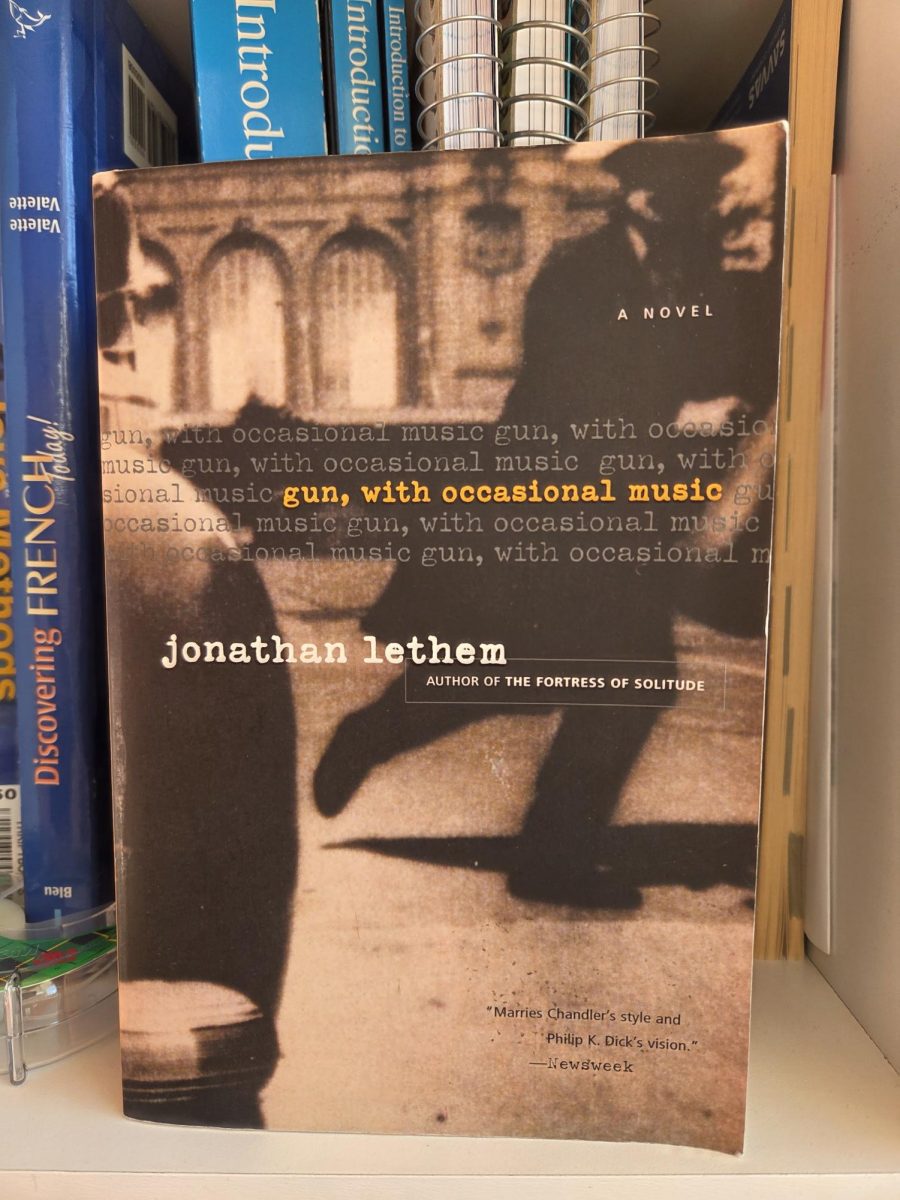Gabe: Hi, I’m Gabe Sachse. I’m a Managing Editor for Harker Aquila.
Tiffany: Hi, I’m Tiffany Zhu, and I’m a Co-Sports Editor for Harker Aquila.
Gabe: Today, we’re going to be talking about our reactions to the 97th Oscars, which took place last Saturday in a lengthy ceremony. So big winner of the night, “Anora,” directed by Sean Baker. Tiffany, what did you make of that?
Tiffany: I think “Anora” was a very different movie from a lot of the other movies that were nominated, especially because it was a comedy movie. It did talk about topics that were very important, but I think “Anora” winning in the best picture was something that was unexpected, but it was something that a lot of people wanted.
There was talk that because the best actress went to Mikey Madison, there was talk that the Academy Awards were maybe leaning towards that younger profile because a lot of people wanted Demi Moore to win for “The Substance,” and the entire theme of “The Substance” was about people outgrowing that Hollywood industry. I think there’s still a lot of joy that “Anora” won for these sections, even if it was unexpected.
Gabe: I found the meta commentary about “Anora” and “The Substance” interesting because, at least from my not grounded in personal reality, just from a critical lens of “The Substance,” I always thought that it was about the way that women go at each other and are often unfairly forced to attack each other because of the expectations of men, especially in the entertainment industry. Pitting Demi Moore and Mikey Madison, who have shown nothing but respect and admiration for each other — both are excellent actresses who turned in excellent performances, by the way — did seem like a total antithesis to what “The Substance” was talking about. I did understand a lot of people were very spirited about Demi Moore’s performance. I certainly was. Out of the nominees, she was my pick.
It would have been a great win for her, but I’m also really happy that Mikey Madison got her shot to reach that Oscars immortality. It was looking like early on in the award season, “Emilia Pérez,” which I personally really did not like, was going to sweep all these categories, including Best Actress for Karla Sofía Gascón. I’m glad that of the contenders, immediately pre-Oscar night, people were thinking it was either going to be “Anora” or “Conclave.” I’m glad that “Anora” took home all the top prizes. I think it was a well-deserved win, even though it wasn’t my absolute favorite movie of the year.
Best Actor was another very talked about category, as it always is, with the two top contenders, based off PR campaigns, Adrien Brody and Timothée Chalamet, duking it out until the last moment. So, Tiffany, what did you think of Adrien Brody’s win for “The Brutalist,” and what did you think of his almost six minute long speech?
Tiffany: “The Brutalist” was a very difficult movie to watch, and I think that is because of Adrien Brody’s portrayal. I remember watching an interview with Adrien Brody where he also had very long statements as all of his answers, but it just really goes to show how much care and how much time and energy he put into his character.
We sometimes see these people on the screen, and they put on these amazing performances where you forget that there’s an actual person portraying them. But Adrian Brody, through his interviews and through his speech, he was able to show he had put in the work to deserve the Oscar award. I think that was very clear in his performance, and everything he did to bring his character to life.
Gabe: I personally, I love “The Brutalist.” It was a bit of a slog at times, an over three hour long movie, even with the intermission, which made for an interesting theater going experience, but it’s really immersive. The cinematography, which won the Oscar on Saturday, is insane. Brody’s performance, Felicity Jones’s performance, Guy Pearce’s performance, all arguably Oscar worthy.
Though, if the Academy were to honor a historical, not necessarily epic, but a historical movie that went really in depth into the lives of fictional characters in a particular time period, I really think it should have put more emphasis on “Nickel Boys,” which was nominated for Best Picture, but not Best Director or Best Actress, where I do think it should have been nominated and won for the performances of RaMell Ross in the directorial role and Aunjanue Ellis-Taylor in the lead actress role.
“Nickel Boys” was a masterpiece. It was by far my favorite film of the year — the things that they did with first person cinematography, the flawless adaptation of what was an excellent novel about the Jim Crow South and growing up in it — I really thought that it had both the cinematic, filmic substance and the Oscar worthy elevation of otherwise indie names that “Anora” ended up receiving from the academy. I thought it had what it took to dominate the Oscars, and it ended up not picking up as much steam as I thought it would.
Similarly, I thought Colman Domingo turned in a great performance in “Sing Sing,” which was released far too early in 2024 to be really remembered as an Oscar contender, but Domingo did get a well-deserved nomination, and in my opinion, probably should have won the overall award. But considering Brody’s comeback after basically 20 plus years out of the spotlight since his last Oscar win, and Chalamet’s incredible popularity and his string of great performances and great films, it’s easy to see why those two got a lot of hype before the awards.
On the topic of snubs or films slash people that you think should have been awarded more, what did you think of “Dune: Part Two,” which was perhaps the biggest blockbuster of the year, not receiving that much recognition. I know it won two Oscars, but a lot of people were upset about Denis Villeneuve, who didn’t get Best Director, and Chalamet being chosen for his role as Bob Dylan over his role as Paul Atreides. Any thoughts on that?
Tiffany: I think “Dune: Part Two” not getting as much in the Oscars this year is something that is different than what we might have seen in historical Oscars. Dune is a movie where there were hundreds of millions of dollars that were put into production to create the movie, compared to something like “Anora,” a smaller indie film that had a smaller budget. I’m not sure if those are taken account by the Academy people when they’re choosing their awards, but given what both of those films had to work with, and what they were able to put on with the with the supplies that they had, I think “Anora” was able to really come out on top. It was something that I don’t think people really expected to be as hyped up compared to “Dune: Part Two,” which had already had a lot of support coming from “Dune: Part One,” and with all of the blockbuster names in the movie as well.
I do think that “Dune: Part Two” deserved more recognition. “Dune: Part Two” being released in early March of 2024 also gave it a harder stepping stone to get that Oscar award, especially because “Anora” was a movie that came out more recently, and it had more talk surrounding it when Oscar’s nominations and when choosing the awards were happening.
We can talk about the Best Supporting Actor and Best Supporting Actress wins. Best Supporting Actor was Kieran Culkin in “A Real Pain,” and Best Supporting Actress was Zoe Saldaña in “Emilia Pérez.” What thoughts do you have on those?
Gabe: As far as “A Real Pain” goes, I thought that it was honestly another underrated movie to come out of this. This year in film, Jesse Eisenberg turned in a great lead performance, which went completely under the radar among a ton of great leads, but Kieran Culkin, who was also arguably a lead in that film, but got Best Supporting, I suppose, because the film wasn’t through his eyes — we can argue the standards about that all day.
Culkin dominated award season. He was incredible in the movie. He has an insane screen presence that can be seen in anything from his work as a child actor all the way through “Succession,” which he also won an Emmy for a Best Leading Actor in a Drama. I think that award makes sense. He is a recognizable name because he comes from the Culkin family. Obviously, his brother Macaulay is the “Home Alone” kid, all grown up now of course, and because of his work in “Succession.”
I do think that Jeremy Strong, another former “Successioner,” for his portrayal of Roy Cohn in “The Apprentice” should have gotten more buzz. I don’t think that Guy Pearce’s performance in “The Brutalist” should be forgotten either because he was almost the anti-heart of that movie. The way that Felicity Jones and Adrien Brody were always so overcome by emotion, Guy Pearce did a great job of remaining a stoic but nuanced antagonist. That really helps those three and a half hours go by at a much more manageable pace.
Saldaña, on the other hand, got a lot of buzz early when “Emilia Pérez” was a big contender, but after the scandal surrounding Karla Sofía Gascón and her inflammatory and racist tweets, I really wasn’t expecting her to get out of that with her Oscar hopes intact and alive. I don’t think she turned in an especially strong performance. She also, very clearly, was not the supporting actress in that movie — she was the lead. It was through her perspective, if anything. Even though the movie is named after Karla Sofía Gascón’s character, Emilia Pérez was the supporting actress in her own movie.
With that being said, it’s not the most egregious Oscar win we’ve ever seen. She turns in an okay performance in what’s a really bad movie. She elevates it to almost watchable. She does a good job conveying a lot of emotion, and has had a very successful career for which she has not been recognized enough. I’m not too mad at it, but I do think that The Academy should hold itself to higher standards in general.
I’m interested, Tiffany, about your thoughts regarding The Academy’s voting process as a whole. There’s a lot of talk about how Academy members didn’t get through the longer movies, including “The Brutalist” and “Dune: Part Two,” or misremembered the history of the awards, causing them to give out votes to actors who they think deserved more recognition because they hadn’t gotten an award in the past, when in fact, they had (see Adrien Brody or the reverse see Ralph Fiennes for “Conclave,” who people thought won the Best Actor Award for Liam Neeson in “Schindler’s List.”) What do you make of the highest body of film value in the industry, not having that active of a voter base?
Tiffany: So, you summed up a lot of the issues with that. One area where I think The Academy voters are very important, and it shows, especially in this Oscar season, was the timing of the movies. If people are watching the movies around the same time where they’re getting released, or even just not watching the movie at all, that goes to show that some of the movies that were released earlier in the Oscar season could sometimes be forgotten about, compared to some of the movies that were more recent.
Like we said before, “Dune: Part Two” getting released much earlier than some of the movies that ended up picking up the bigger words of the night — that shows that the Academy voters are also people who watch a movie, they have their thoughts on it, but at the end of the day, they could forget a movie and the importance of the movie as we go almost a year into the future when they actually start voting. I think that’s one point of concern.
Gabe: For all the criticism The Academy gets, and I agree with all of your points regarding the fallibility of human voters and the way that movies are structured to get Oscar buzz, but I do think that The Academy made important choices when they, as you mentioned earlier, decided to put “Anora” up on a pedestal as the most important or best movie of the year, depending on how you view Best Picture and all the awards that “Anora” received.
As Sean Baker mentioned in his closing speech, and as he mentioned throughout, along with his production team, which includes his wife, Samantha Quan, independent film is a vital part of the industry. It keeps new ideas flowing. It gives us great new directors — see one of my all time favorite films, “Moonlight.” Before its Best Picture, its director, Barry Jenkins, was primarily and totally, actually, an indie filmmaker. Since then, he’s been able to get bigger budgets and put his ideas onto bigger screens, and I think that’s fantastic. I think that’s what these award ceremonies should be about: uplifting voices in film and making sure that people get the representation on screen and the support in the production rooms that they deserve based on the quality of their art and the importance of the stories that they are telling with that.
Thank you so much for listening to our review of the Oscars, both the awards and the ceremony. For more A&E or movie content, check out harkeraquila.com, and we will see you later.


















![“[Building nerf blasters] became this outlet of creativity for me that hasn't been matched by anything else. The process [of] making a build complete to your desire is such a painstakingly difficult process, but I've had to learn from [the skills needed from] soldering to proper painting. There's so many different options for everything, if you think about it, it exists. The best part is [that] if it doesn't exist, you can build it yourself," Ishaan Parate said.](https://harkeraquila.com/wp-content/uploads/2022/08/DSC_8149-900x604.jpg)




![“When I came into high school, I was ready to be a follower. But DECA was a game changer for me. It helped me overcome my fear of public speaking, and it's played such a major role in who I've become today. To be able to successfully lead a chapter of 150 students, an officer team and be one of the upperclassmen I once really admired is something I'm [really] proud of,” Anvitha Tummala ('21) said.](https://harkeraquila.com/wp-content/uploads/2021/07/Screen-Shot-2021-07-25-at-9.50.05-AM-900x594.png)







![“I think getting up in the morning and having a sense of purpose [is exciting]. I think without a certain amount of drive, life is kind of obsolete and mundane, and I think having that every single day is what makes each day unique and kind of makes life exciting,” Neymika Jain (12) said.](https://harkeraquila.com/wp-content/uploads/2017/06/Screen-Shot-2017-06-03-at-4.54.16-PM.png)








![“My slogan is ‘slow feet, don’t eat, and I’m hungry.’ You need to run fast to get where you are–you aren't going to get those championships if you aren't fast,” Angel Cervantes (12) said. “I want to do well in school on my tests and in track and win championships for my team. I live by that, [and] I can do that anywhere: in the classroom or on the field.”](https://harkeraquila.com/wp-content/uploads/2018/06/DSC5146-900x601.jpg)
![“[Volleyball has] taught me how to fall correctly, and another thing it taught is that you don’t have to be the best at something to be good at it. If you just hit the ball in a smart way, then it still scores points and you’re good at it. You could be a background player and still make a much bigger impact on the team than you would think,” Anya Gert (’20) said.](https://harkeraquila.com/wp-content/uploads/2020/06/AnnaGert_JinTuan_HoHPhotoEdited-600x900.jpeg)

![“I'm not nearly there yet, but [my confidence has] definitely been getting better since I was pretty shy and timid coming into Harker my freshman year. I know that there's a lot of people that are really confident in what they do, and I really admire them. Everyone's so driven and that has really pushed me to kind of try to find my own place in high school and be more confident,” Alyssa Huang (’20) said.](https://harkeraquila.com/wp-content/uploads/2020/06/AlyssaHuang_EmilyChen_HoHPhoto-900x749.jpeg)






















